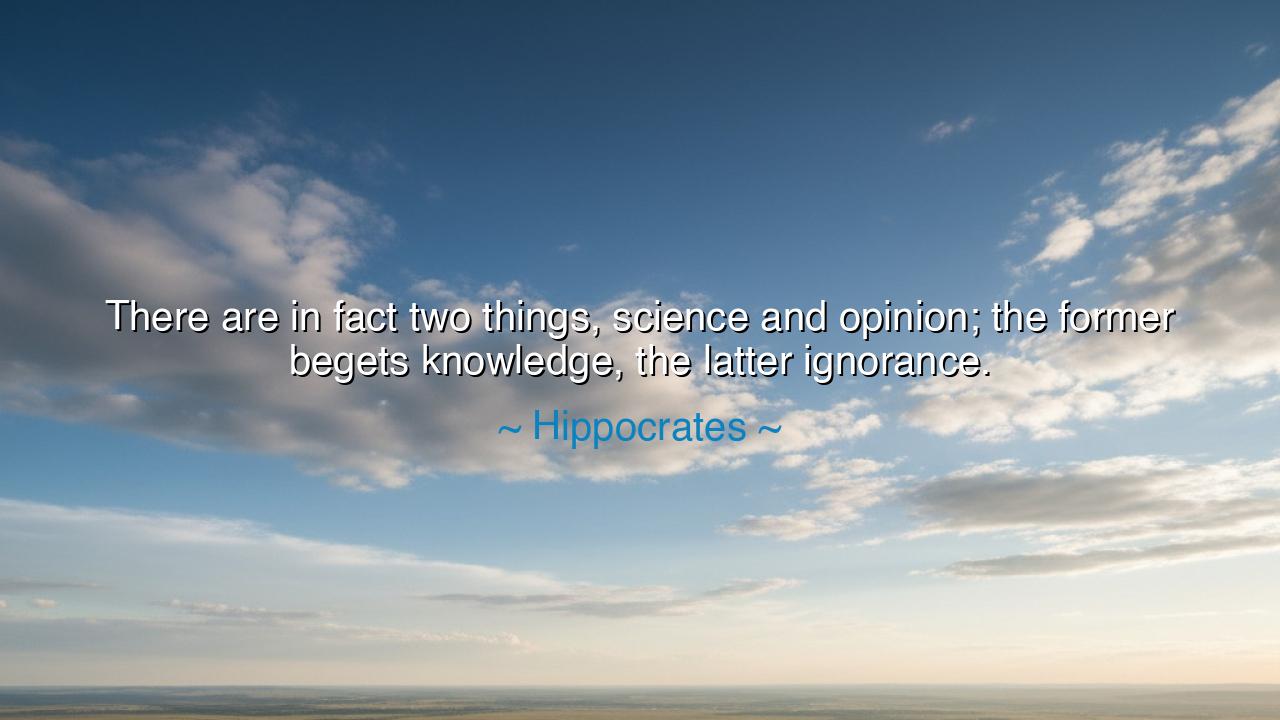
There are in fact two things, science and opinion; the former
There are in fact two things, science and opinion; the former begets knowledge, the latter ignorance.






The ancient physician Hippocrates, often called the Father of Medicine, once said: “There are in fact two things, science and opinion; the former begets knowledge, the latter ignorance.” These words are not merely a reflection on medicine but a timeless declaration about truth itself. In them, Hippocrates divides the world of thought into two realms — one illuminated by science, the disciplined pursuit of truth through observation and reason; the other clouded by opinion, the restless echo of belief untested by evidence. His message is clear: wisdom is born from understanding reality as it is, while ignorance thrives when men mistake their assumptions for knowledge.
In the age of Hippocrates, Greece was awakening to the dawn of rational inquiry. The gods still thundered in the heavens, but the human mind had begun to seek the laws behind the thunder. Hippocrates broke from the superstitions that claimed sickness was punishment from the divine. Instead, he looked to the natural world, to patterns, to cause and effect. By studying symptoms, climates, and the habits of the body, he founded a new way of thinking — science as disciplined observation, as the art of seeing clearly. In this, his quote becomes not only a statement of method but a moral conviction: that truth must be earned through study, not assumed through pride.
He spoke these words as both warning and challenge. Opinion, in his view, is the disease of the mind — quick to form, slow to heal. It is born of comfort, not courage. It flatters the ego and resists correction. Science, on the other hand, demands humility; it requires one to say, “I do not yet know.” The difference between the two is the difference between the physician who listens to the patient and the one who prescribes by habit; between the sailor who studies the stars and the one who sails blind by instinct. Where science begets knowledge, opinion breeds ignorance — and ignorance, when left unchallenged, becomes destruction.
History has repeatedly proven Hippocrates right. When Galileo turned his telescope toward the heavens, opinion declared him a heretic; science declared him a discoverer. When Ignaz Semmelweis urged doctors to wash their hands to prevent infection, the world mocked him — until knowledge, tested and proven, vindicated him long after his death. In every age, truth walks a narrow path between courage and doubt, while opinion, clothed in certainty, shouts from every corner. The wise few who follow evidence rather than echo are those who carry civilization forward.
Hippocrates himself understood this battle within the human heart. He knew that to heal the body, one must first heal the mind of illusion. The healer who trusts opinion may soothe his pride but not his patient. The one who follows science, however — who observes, measures, and learns — becomes an instrument of nature’s truth. In this, his teaching transcends medicine: it is a law for all human endeavor. For in every art, every craft, every life, progress depends upon the courage to see clearly and the humility to admit when one does not yet understand.
The emotional power of Hippocrates’ quote lies in its eternal relevance. Today, as in his time, the world overflows with information but starves for wisdom. Voices of opinion multiply faster than the quiet labor of truth. We live in an age where everyone speaks, yet few listen; where conviction outpaces comprehension. To remember Hippocrates’ words is to remember that knowledge is not loud, but steady — that it grows like light in the dawn, pushing back the darkness inch by inch.
The lesson, then, is this: seek truth with patience, not pride. Let every belief be tested by reason, every claim weighed by evidence. When faced with uncertainty, choose to learn rather than to assume. Be as the healer, not the judge; as the student, not the zealot. Let science — in whatever form it takes — be your compass, and let opinion be only the starting point of inquiry, never its end.
For when the mind aligns with truth, it becomes luminous. It frees itself from the tyranny of ignorance and grows in harmony with the universe. This was Hippocrates’ wisdom — that through the discipline of science, man may rise above illusion, and in so doing, come to know not only the world but himself.






AAdministratorAdministrator
Welcome, honored guests. Please leave a comment, we will respond soon